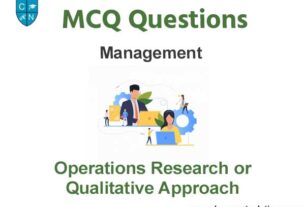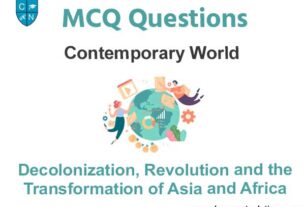Please refer to Organizational Development MCQ Questions with Answers provided below. These multiple-choice questions with solutions are really important if you are preparing for Human Resource Practice examination. We have provided these objective questions based on the latest syllabus and examination guidelines for the current academic year. We have also provided MCQ Questions for Human Resource Practices for all chapters on our website.
MCQ Questions with Answers Organizational Development
You can test your understanding by going through the Organizational Development MCQ Questions with Answers provided below. All the latest questions have been provided by our expert teachers for you to download in Pdf.
Question. Which is the Human Relation Policy?
(a) Open communication
(b) Common interest
(c) Mutual acceptance
(d) All of the above
Answer
A
Question. Which of the following is a challenge mentioned in remuneration?
(a) Employee participation
(b) Pay secrecy
(c) Comparable worth
(d) All of the above
Answer
D
Question. How many components are there in remuneration?
(a) 4
(b) 5
(c) 6
(d) 7
Answer
B
Question. In job-evaluation the Key Jobs are designated as ones
(a) Which are more in number in the organisation.
(b) Which are most important for the survival of the organisation
(c) Which are most secure
(d) All of the above
Answer
B
Question. Match the following components of remuneration with their inclusions –
| I. Fringe Benefits | (a) Stock option |
| II. Job Context | (b) Challenging job responsibilities |
| III. Perquisites | (c) Group Plans |
| IV. Incentives | (d) Medical Care |
(a) I-D, II-B, III-A, IV-C
(b) I-B, II-A, III-C, IV-D
(c) I-A, II-C, III-D, IV-B
(d) I-C, II-B, III-D, IV-A
Answer
A
Question. Which of these is an internal factor influencing remuneration?
(a) Business strategy
(b) Cost of living
(c) Legislations
(d) Society
Answer
A
Question. Which are the three types of equities mentioned in the equity theory?
(a) Internal
(b) External
(c) Individual
(d) All of the above
Answer
D
Question. Assertion (A) A Manager delegates authority.
Reason (R) The Manager want to shirk his responsibility.
(a) Both (A) and (R) are true.
(b) Both (A) and (R) are false.
(c) (A) is true but (R) is false.
(d) (A) is false but (R) is true.
Answer
C
Question. Rearrange the steps mentioned in a remuneration model.
A Pay survey
B Job evaluation
C Pricing jobs
D Job hierarchy
E. Job description
(a) ABCDE
(b) DCBEA
(c) EBDAC
(d) EACDB
Answer
C
Question. In organized industrial establishments pay review takes place once in ____ years.
(a) Three
(b) Seven
(c) Ten
(d) Fifteen
Answer
A
Question. What is the alternate name for incentives?
(a) Gratuity
(b) Paid holidays
(c) Payments by result
(d) None of the above
Answer
C
Question. Who are the two main stakeholders in an organisation?
(a) CEO and top management
(b) Employers and employees
(c) Executives and owners
(d) None of the above
Answer
B
Question. Effective supervision is an activity of
(a) Organization function
(b) Staffing function
(c) Control function
(d) Direction function
Answer
D
Question. Which importance is emphasised by the reinforcement and expectancy theory?
(a) Person actually experiencing award
(b) Seeking to restore equality
(c) Holding identical jobs in the organisation
(d) None of the above
Answer
A
Question. Any compensation plan must be
(a) Understandable, workable, acceptable
(b) Reasonable, workable, acceptable
(c) Understandable, feasible, acceptable
(d) Understandable, workable, compensable
Answer
A
Question. Statements:
(i) Fringe benefits, nowadays are a significant component of ‘compensation’.
(ii) Under· piece rate plan employees are paid at a stipulated rate per hour of work done by them.
(a) Both (i) and (ii) are correct
(b) Both (i) and (ii) are incorrect.
(c) (i) is incorrect and (ii) is correct.
(d) (i) is correct and (ii) is incorrect.
Answer
D
Question. Incentives depends upon
(a) productivity
(b) sales
(c) profits
(d) All of the above
Answer
D
Question. A ——– is a collection of duties, tasks and responsibilities which are assigned to an individual and which is different from the assignment.
(a) Job
(b) Human Resource Planning
(c) Industrial Relations
(d) Responsibility
Answer
A
Question. Which of these is a consequence of pay dissatisfaction?
(a) Strikes
(b) Grievances
(c) Turnover
(d) Job dissatisfaction
Answer
D
Question. The following is paid only at the time of employees exit after serving more than five years.
(a) Perquisites
(b) Claims
(c) Gratuity
(d) Allowances
Answer
C
Question. Assertion (A) Employee development is more future oriented and more concerned with education than employee training.
Reason (R) Apprenticeship programme is one of the widely used off the job training method.
(a) (A) and (R) both are the correct.
(b) (A) and (R) both are the incorrect.
(c) (A) is correct but (R) is incorrect.
(d) (A) is incorrect but (R) is correct
Answer
C
Question. ———- is the process of deciding how to fill the company’s most important executive positions.
(a) Succession Planning
(b) Organisational Restructuring
(c) Self directed Teams
(d) Corporate downsizing
Answer
A
Question. Compensation can be _____ benefits.
(a) Monetary
(b) Non-monetary
(c) both ‘a’ and ‘b’
(d) None of the above
Answer
C
Question. Which of the following option is a component of remuneration?
(a) Fringe Benefits
(b) Commitment
(c) External equity
(d) Motivation
Answer
A
Question. Elitist remuneration systems are prevalent among
(a) Well established firms
(b) Companies with mature products
(c) Companies with limited competition
(d) All of the above
Answer
D
Question. Which of the following factor influence(s. employee compensation?
(a) Labour market
(b) Cost of living
(c) Labour unions
(d) All of the above
Answer
D
Question. ______ are also called ‘payments by results’.
(a) allowances
(b) claims
(c) incentives
(d) fringe benefits
Answer
C
Question. Under which conditions does skill – based pay system work well?
(a) Employee turnover is relatively high
(b) To set minimum wages for workers whose bargaining position is weak
(c) To abolish malpractices and abuses in wage and salary payments
(d) None of the above
Answer
A
Question. According to Taylor’s Differential plan, the worker is paid according to his?
(a) Degree of efficiency
(b) Degree of understanding
(c) Degree of flexibility
(d) Degree of loyality
Answer
A
Question. The following is a perquisites.
(a) Club membership
(b) Provident fund
(c) Medical allowance
(d) Group insurance
Answer
A
Question. Which of the wage concept is higher than fair wage?
(a) Minimum wage
(b) Living wage
(c) Team based pay
(d) None of the above
Answer
B
Question. _____ involves the perceived fairness of pay differentials.
(a) External equity
(b) Individual equity
(c) Internal equity
(d) All of the above
Answer
C
Question. Which four are the factor influencing the Human Resource Management of an organisation.
(i) Size of workforce
(ii) Employee Expectations
(iii) Composition of work force
(iv) Political influence
(v) Change in technology
(a) (i) , (ii) , (iii) and (iv)
(b) (i) , (ii) , (iii) and (v)
(c) (i) , (ii) , (iv) and (v)
(d) (i) , (ii) , (iv) and (v)
Answer
C
Question. ‘A behaviour which has rewarding experience is likely to be repeated’ is postulated by
(a) Reinforcement and expectancy theory
(b) Equity theory
(c) Agency theory
(d) None of the above
Answer
A
Question. The following is not a part of remuneration model
(a) Job description
(b) Job evaluation
(c) Job hierarchy
(d) Job analysis
Answer
D
Question. Off the Job Training Method consists
(a) Role Playing Method
(b) Case Study Method
(c) Programmed Training
(d) All of the above
Answer
D
Question. ‘A fair day work for fair day pay’ denotes a sense of _______ felt by employees.
(a) Responsibility
(b) Equity
(c) Happiness
(d) Respect
Answer
B
Question. Which of these is a theory of remuneration?
A Reinforcement
B Labour Market
C Agency
(a) A & B
(b) B & C
(c) A & C
(d) A, B & C
Answer
C
Question. Wages represents _____ rates of pay.
(a) Hourly
(b) Daily
(c) Weekly
(d) Monthly
Answer
A
Question. The remuneration system needs to meet the following type(s. of equity.
(a) Internal
(b) External
(c) Individual
(d) All of the above
Answer
D



